- Home
- Mollie Cox Bryan
Scrapbook of the Dead Page 9
Scrapbook of the Dead Read online
Page 9
“Something odd going on there,” DeeAnn said. “Why are all these women who worked at the Pie Palace getting killed?”
“Marina’s sister didn’t work there,” Annie pointed out.
“I agree with DeeAnn,” Vera said as she turned the page on her scrapbook and looked over a fresh, blank spread of paper. “I love Pamela’s pie, but I’ve always found her a bit off-putting and now all this. I wonder what’s going on.”
“Why do you find her off-putting?” Cookie asked.
“The way she dresses for one thing,” Vera said. “Like she’s a showgirl instead of a restaurateur.”
“She has her own style, that’s for sure,” Randy said.
“But you know there’s something else. Mama has been trying to reach the Martelinos’ parents to send her condolences. She has yet to be able to do that. I think she’s just about given up. But I don’t understand what the big deal is,” Vera said.
“What do you mean?” DeeAnn asked.
“She’s talked with Pamela. She’s called the employment agency. No luck,” Vera said. “It’s like these women have no ties. I find that hard to believe.”
“Maybe that’s the way they wanted it. Maybe they never wanted to go back.” Cookie said it quietly, but the words had weight, coming from her. She was still working on remembering. Still in therapy.
DeeAnn had considered on more than one occasion that maybe Cookie didn’t want to remember.
“Why?” Sheila spoke up. “I’m sure they have family.”
“Maybe not,” Cookie persisted. “Life in some of those countries is difficult. Their parents might not be alive. There may not be anybody.”
“That’s true,” Annie said after a few minutes of silence, save for the sounds of paper being shuffled and scissors snipping. “I have a few calls in to Immigration. It may be awhile for them to get back to me. But I haven’t really found Pamela helpful, either. She claims she doesn’t know much about them.”
“That’s probably true,” Randy said. “I like Pamela. She’s a pro, very polite, very friendly. But she’s not one you can easily warm up to if you know what I mean. Now, what do I do with this?” He held up a piece of blue netting.
Sheila rose from her place at the card table and went over to where he was. “Pull it, then place the sticky-side down on the page.”
“Very cool,” said Randy as he attached the netting.
“Now you can place paper or a photo on top of that. What a great picture,” she said.
DeeAnn saw that it was a photo of him and his dad at Halloween. How about that? It inspired her to see Randy at the scrapbooking table and to know that he and his father were getting closer. That surprised her. She knew that Paige was thrilled with the way things were working out.
“Have you found a house yet?” DeeAnn asked him.
“Not yet. I’m not in a hurry. I want it to be the perfect situation. I love living at the B and B. Elsie is such a character.”
“Elsie!” Annie said. “You know, I hadn’t remembered until right now that she employed Marina’s sister. I should talk with her.”
“Good idea,” DeeAnn said, feeling a slight pinching in her back. Should she take another pill? It was almost time—so she’d go ahead and take one.
“Let’s see how you’re doing,” Sheila said to Vera and Annie, who were seated next to one another because they were working on the same project—Halloween scrapbooks. The holiday was in a few weeks and Annie, Sheila, and Vera were the only three who had kids that still celebrated. They were working on mini-scrapbooks in preparation for their celebrations. Blank spaces for pictures and journaling, already embellished and so on. It was a clever and efficient way to scrapbook that worked out most of the time.
“I love working this way,” Vera said.
“I’m not sure how I feel about it,” Annie said. “I just don’t know how it’s going to work. I guess I normally take all of my design clues from photos, so I’m a little unsettled.”
“It will work out. You’ll see,” Sheila said.
“What is that?” DeeAnn said, noticing a colorful paper sticking out from under Sheila’s laptop.
“What? Oh, that’s a paper dress,” Sheila said, holding it up.
“I can see that,” DeeAnn said. “Like for a paper doll?”
Sheila nodded and sat down, then dug around in her bag and pulled out an envelope. “Donna and I have been making paper dolls.”
DeeAnn’s heart nearly burst. Paper dolls! She was transported to her childhood when she had spent hours playing with paper dolls. In fact, she still had some of them. Her hand went to her ample bosom and tears stung her eyes.
“DeeAnn?” Paige said. “What is it?”
“The dolls are so charming.” DeeAnn watched Sheila spread them out on the table. “I remember my mom and I cutting them out. The stories we would tell with them. . . .” She started to cr y—not sweet little nostalgic tears, but huge, ugly sobs. Oh time, what have you done to me?
“DeeAnn?” Randy said, handing her some tissue. “Are you all right?”
She pointed to the dolls and tried to gather herself.
“Good Lord, I didn’t mean to make you cry,” Sheila said and began to gather up the dolls and their paper clothes.
“Leave them!” DeeAnn said. “I want to see them.”
“I agree,” Paige said, her face flushed with excitement. “They’re delightful.”
“Not just delightful . . . but remarkable,” Randy said in a hushed tone.
A silence came over the group as they pored over the homemade paper dolls. Tiny paper girls and women of all shapes and sizes with long, red hair, short, black hair, and many shades of brown. Paper dresses and shirts, skirts, and pants—blue, orange, red, all colors. But what made them extraordinary, DeeAnn thought as she ran her fingers over the smooth paper, were the details so meticulously drawn on. The lace collars, the colorful buttons, the floral prints.
“My goodness,” Sheila said. “They are just simple paper dolls. It’s something Donna and I have made together since she was a girl. It’s become a habit. And now that she’s home . . . well . . . we’ve started doing it again. This time, with a little more flair, I suppose.”
“You should show these to your boss,” Randy said.
“What? Whatever for?” Sheila said.
Randy shrugged. “Who knows? Maybe they could start an upscale paper dolls line.”
“Nobody plays with paper dolls anymore,” Paige said. “It’s all about electronics these days.”
DeeAnn drew in a breath and hoped she was wrong. Oh the hours she spent with her paper dolls as a girl. She and her sister Diane wiled away the hours with them.
The doorbell sounded. They all wondered who it could be. Everybody, except Beatrice was already assembled.
Randy answered the door. “Detective Bryant. Please come in.”
Chapter 25
Detective Adam Bryant and Sheriff Ted Bixby walked into DeeAnn’s living room. The scrapbookers all looked up from the paper dolls and sat back in their chairs, watching the two men.
“Good evening, ladies,” Bryant said. “Change your locale?”
“Well, DeeAnn’s back has been out so we thought we’d have the crop here,” Sheila said.
“Yes, we talked to your husband,” the sheriff said. “Good evening, ladies. We won’t bother you too much. Just have a few questions for you.”
Annie sat back and crossed her arms. This was odd. The county sheriff and Detective Bryant working together. She knew they didn’t like one another.
“Never thought I’d see the day you two would be walking into my house together.” Leave it to DeeAnn to say what they were all thinking. “Has hell frozen over?”
Both men smiled, but did not look at one another and shifted their weight around in discomfort.
“We’re pooling resources on the Martelino cases,” Bryant said, holding up a plastic bag with a scrapbook page in it.
The sheriff held his own plast
ic bag up. “Same paper. The labs could tell us nothing. Meaning, there are no fingerprints. Nothing distinguishing about the paper or the photos.”
The two of them set their papers down on the card table.
It was fairly typical scrapbook paper—green with a floral pattern. Each page had one photo. One of them featured a black-framed picture of a group of people at a picnic. Along with the picture, someone had started journaling in Spanish. Annie couldn’t decipher it. The handwriting was difficult to read.
“The writing there is about Marina’s new home. How lovely it is. How she loved the mountains,” Bryant said.
Annie’s heart sank. Once again, a woman killed in her prime.
The other scrapbook page had orange-framed photos. The picture was of a group of women—including one of the sisters, Esmeralda.
“Check out that picture,” Sheila said. “Look at the background . . . on the picnic table. There are scrapbooks and paper and I think . . . some embellishments.”
The detective nodded. “Yep, these women scrapbooked together regularly.”
“Holy shit,” DeeAnn said.
“Turns out you’re not the only scrapbookers in town,” Sheriff Bixby said.
“Well, of course, we aren’t. I run a scrapbooking business and at least half the women in this town have bought materials from me,” Sheila said. “But I don’t think these in the pictures have ever come to my basement to buy supplies.”
“What can you tell us about this paper? These women?” Detective Bryant asked.
“The women look vaguely familiar, but I don’t know that paper,” Sheila said. “It’s not in my line of products.”
Annie recognized one of the women. She was the same woman who had been behind the counter at the apartment complex. Annie kept that bit of information to herself.
“Are you certain?” Bryant asked Sheila again.
Sheila thought a moment. “If we carry it, it’s very old. It’s possible that I don’t remember it.”
“It looks familiar to me,” Cookie piped up.
“You’ve seen one floral design, you’ve seen them all,” Paige said and waved her off.
“No,” Cookie persisted. “This is different. The green isn’t typical. It’s very dark.”
“True,” Paige said. “But for a while, that was all the rage.”
“Two years ago,” Sheila said, “all of our floral paper had that antique look to it.”
Cookie stood up. “I think I have this paper.”
“What?” Bryant said, lurching back.
“Let me see.” She walked over to her bag where she stored her paper supply and rifled through it. “Yes. Here it is.”
“Where did you get it?” Sheriff Bixby asked her.
“I don’t remember,” she said automatically. “I’m sorry. But I never buy my supplies from anybody but Sheila.”
“Well,” Sheila laughed nervously. “I guess that answers that question.”
“Oh, look at the other side,” Paige said.
Cookie turned the page over and set it in the middle of the table. The back of the page was black and the corners looked ragged, with bits of green coming through. The top of an orange moon peeked up from the bottom of the page.
“Ah,” Sheila said. “Yes, now I remember this paper. It was a part of the Summer Dream pack from two years ago, I think. I can look that up for you.” She opened her laptop.
Paige went back to her project in front of her, as did Randy. Annie watched as DeeAnn watched Sheila with her laptop, her fingers moving quickly over the keyboard.
“Yes,” Sheila said finally. “It was two years ago and it was part of a pack. I gave out several of these at a public Fourth of July crop last year. Let’s see, I gave out . . . twenty-six.”
“Did you keep the names?” Sheriff Bixby asked.
“I have the names of everybody who attended the crop, but not who received which pack as prizes,” Sheila said. “If they bought the pack, I have those records.”
“Sounds like a good start,” Annie said.
“Indeed.” Sheriff Bixby looked at her, once again, with an approving glance.
Bryant picked up on it and shot daggers with his eyes toward her.
What the hell? she thought.
“I can print the list of Fourth of July croppers for you,” Sheila said. “And a list of people who bought the paper.”
“No need. Just e-mail it to us.” Bryant handed her his card. “We can print it.”
After the sheriff gave Sheila his card, too, he looked over the table with the food. “What do you ladies have there?”
“There’s plenty here,” DeeAnn said. “Pumpkin bread, muffins. Chocolate. You should try the chocolate. Vera’s really getting good. I’d like to sell her stuff at my shop.”
“Oh, DeeAnn!” Vera blushed. “Thanks so much. Maybe I will take you up on that offer. I love making it.”
“You’re a fabulous student,” Randy said. “You pick things up quickly.”
“How are you doing?” Sheriff Bixby asked Randy as he patted him on the back.
“I’m doing okay,” Randy said. “I’m fine. Every day I feel a little better.”
People had stopped asking Annie if she was okay. They had assumed, of course, that she was because, well, she had seen so many dead bodies, so many murder victims. But it truly never got much easier for her. She was so looking forward to the next stage of her life . . . when she wouldn’t have to will away the bad dreams at night.
“We were trying to reach the Martelino family,” Annie said.
“For what?” Bryant asked, his mouth half full of chocolate.
“We wanted to express our condolences,” she said.
“Well, that’s mighty kind of you,” Sheriff Bixby said.
“Mama tried to find them through their employment agency. So far, nothing.” Vera said.
The detective and the sheriff exchanged uncomfortable glances.
“Pamela doesn’t seem to know much either,” Annie said.
“Pamela is a shrewd businesswoman. She knows she has to be careful what information she gives out,” Sheriff Bixby said, pausing. “I know it’s the tendency of good-hearted women like yourselves to reach out at times like these, but I think in this case, it’s better left alone.”
“I agree,” Bryant said.
Annie’s pings of intuition started up again. Anytime a cop said to “leave it alone” it meant there was more to the story than what they wanted to tell.
“It’s a complicated mess,” Sheriff Bixby said. “And as far as we can tell, the girls’ family is long gone.”
“Did they have any other family here?” DeeAnn asked.
“No,” Bryant said a little too quickly.
“They lived together over on Druid?” Annie asked.
He nodded. Once again, uncomfortable looks were exchanged between the two officers.
“Well, I guess we better go. Thanks, ladies, for the goodies.” Bryant loved his sweets. He was a man who knew good food.
“Before you go,” Vera said, “can I ask you about these gang rumors?”
“It’s more than rumors, I’m afraid,” Bryant said.
“In Cumberland Creek? Absurd!” Vera set her scissors down with a thud.
“Everywhere,” Bryant said. “Cumberland Creek is not immune to the vagaries of modern life, ladies. I thought you’d know that by now.”
“Is it just over there on Druid?” DeeAnn asked with a note of hope in her voice.
“Much of it, but not all,” Bryant said and paused. “As I told Annie, it’s best to stay away from there. Don’t go alone, in any case.”
“Hmmm,” DeeAnn said.
“Don’t get any crazy ideas, DeeAnn, not with your back out,” Sheila said.
“I’m getting better every day,” DeeAnn said indignantly.
Detective Bryant looked at the sheriff and rolled his eyes.
Chapter 26
Beatrice grabbed Jon’s hand. “Let’s go.”
Beatrice led Jon off the trail.
“Where are we going?” he asked.
“I’m curious about something. Bear with me. I remember that I used to walk over here and stop by and see Emma Drummond. They were an old Cumberland Creek family. Farmers, most of them.”
“What happened to them?”
“Most of them died off. I think Emma’s still over at that assisted living place. I can never remember the name of it. Maybe it’s Mountain View?”
They stepped over a small mound and Beatrice stopped. “Yes, the house is still there.”
“It’s barely standing, from what I can see.”
“And look over there,” Beatrice pointed to the apartments on Druid. They could see only a part of them from where they stood. “That was the Drummond apple orchard.”
“I don’t see any apple trees,” Jon said, squinting.
“Gone,” Beatrice said in a hushed tone. Swirls of sadness moved through her, mixed with a longing for simpler days. But were they really simpler? Or just slower? Or was it another one of those tricks of time?
“‘You must have been warned against letting the golden hours slip by; but some of them are golden only because we let them slip by,’” Beatrice said, quoting J.M. Barrie.
Jon clicked his tongue on the roof of his mouth.
Beatrice started moving again, searching for the clearing in a small forested spot on the Drummond property where she and Emma used to sit with their babies and chat about life. How had they lost touch? Beatrice had loved her.
“Too bad about those apples,” Bea said. “The flavor of those apples has never been matched. The family had been farming this land for two hundred years. They’d been given a land grant by Washington himself. The apples were what they call heirloom today. They were tasty, not like the crap you get at the grocery store.”
“Shiny and beautiful but no flavor,” Jon said, moving away some brush for Beatrice to continue walking.

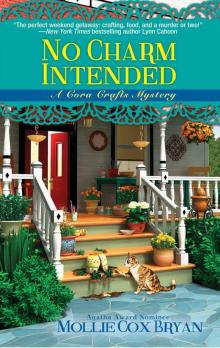 No Charm Intended
No Charm Intended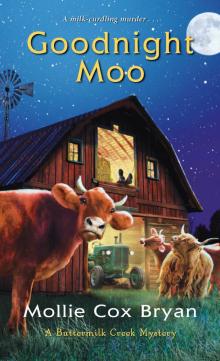 Goodnight Moo
Goodnight Moo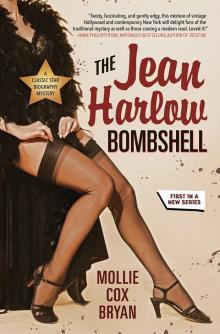 The Jean Harlow Bombshell
The Jean Harlow Bombshell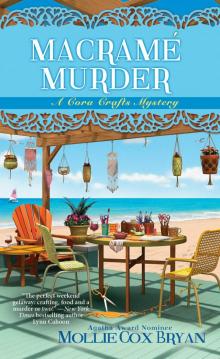 Macramé Murder
Macramé Murder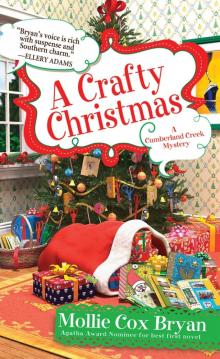 A Crafty Christmas
A Crafty Christmas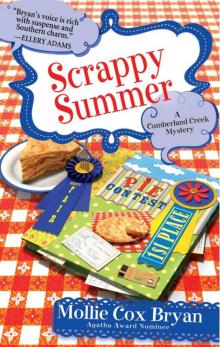 Scrappy Summer
Scrappy Summer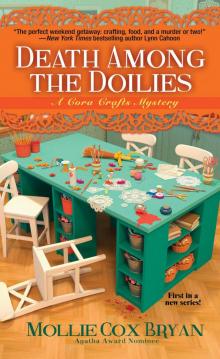 Death Among the Doilies
Death Among the Doilies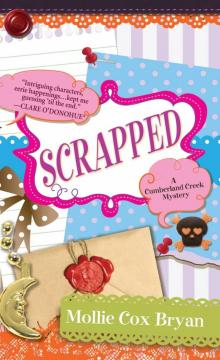 Scrapped
Scrapped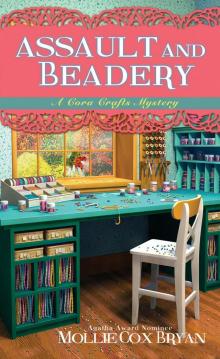 Assault and Beadery
Assault and Beadery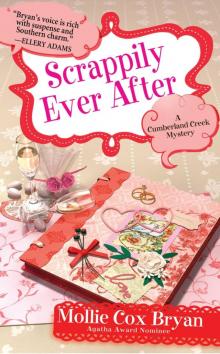 Scrappily Ever After
Scrappily Ever After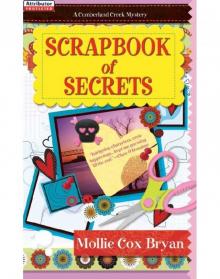 Scrapbook of Secrets
Scrapbook of Secrets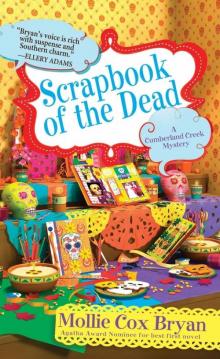 Scrapbook of the Dead
Scrapbook of the Dead